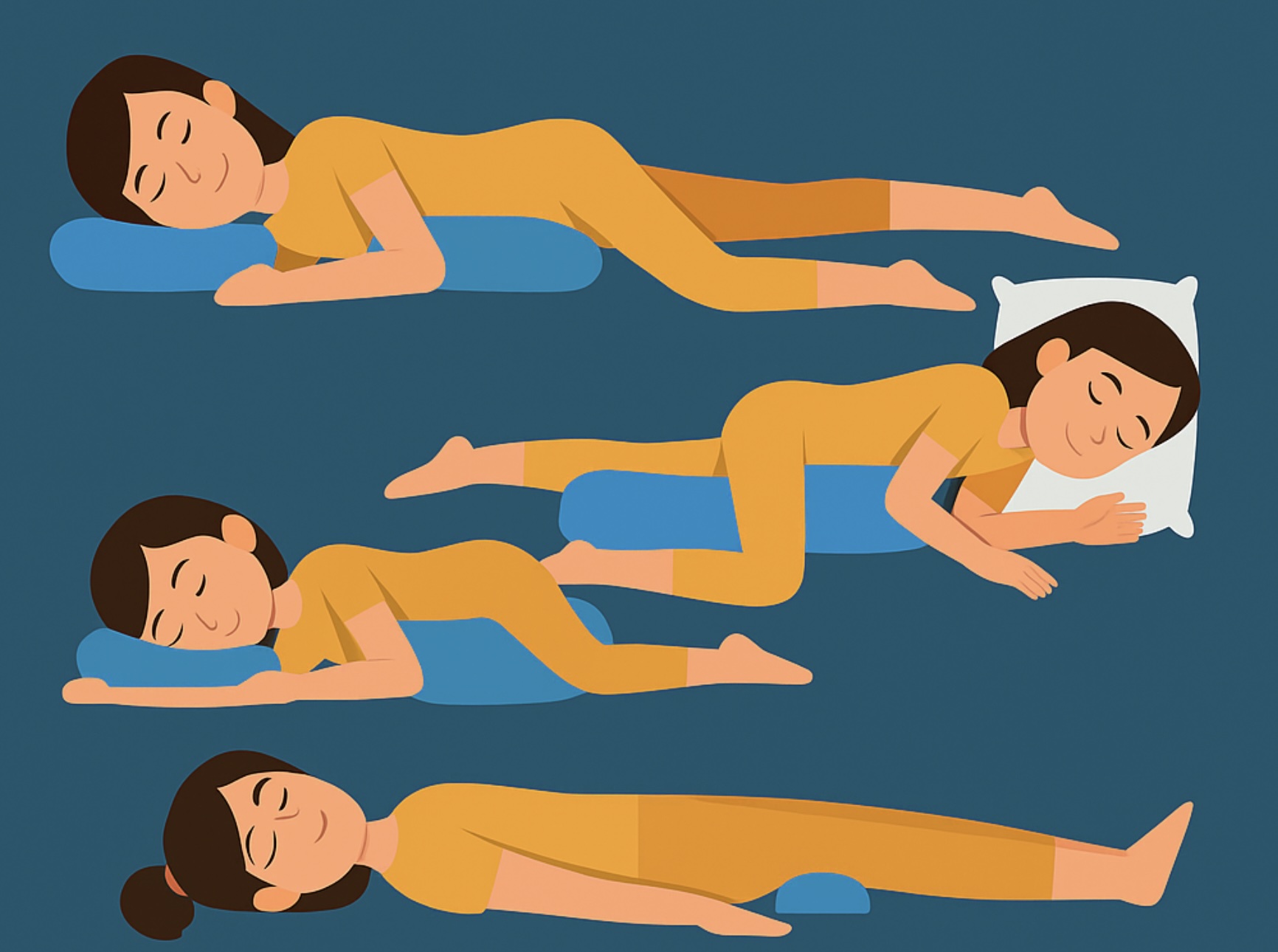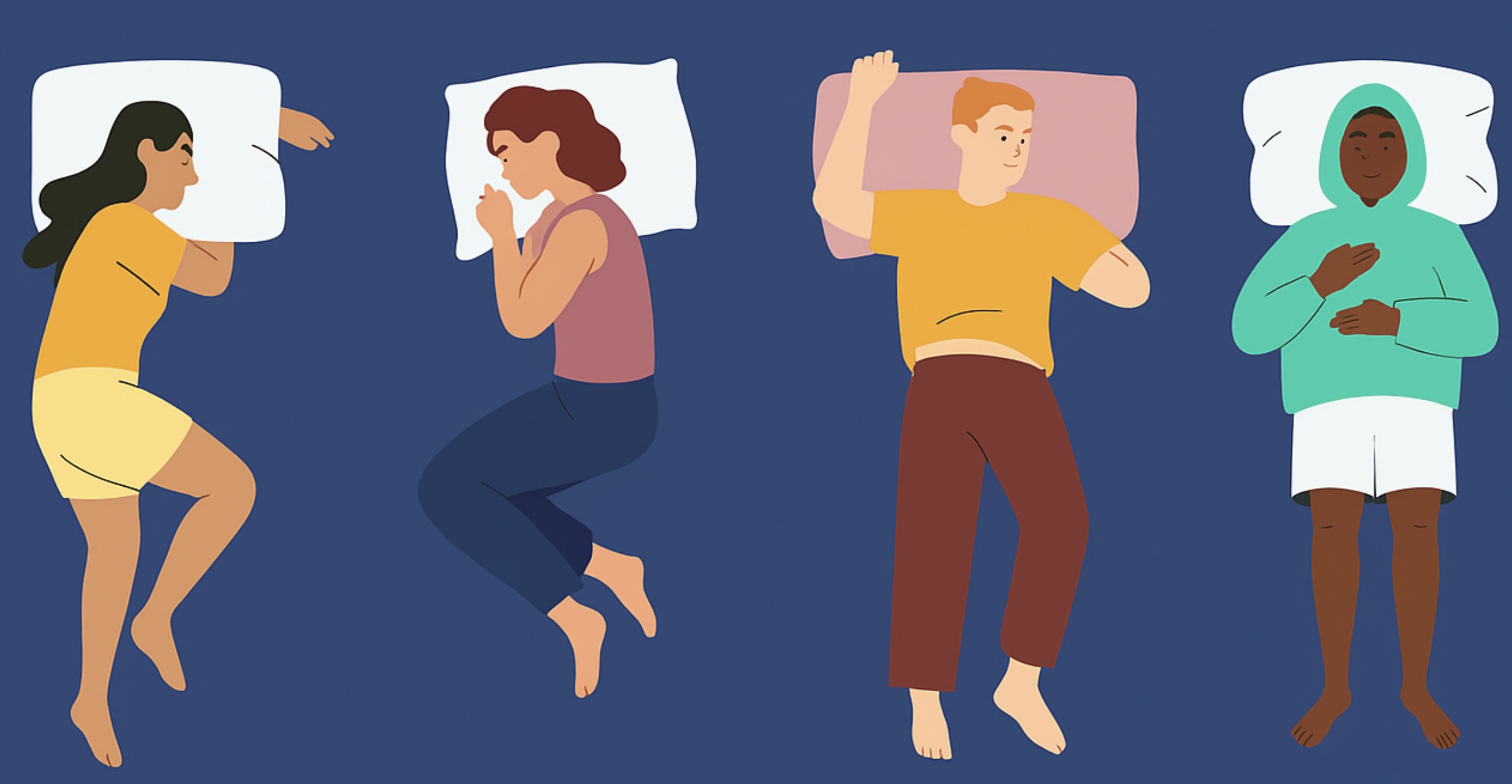
Every night, you settle into your favorite sleep position without much thought. But did you know that how you sleep can significantly impact your health, from your brain function to your digestive system? Recent research reveals that your sleep position isn't just about comfort, it's a critical factor in how well your body recovers, repairs, and even clears toxins from your brain. Understanding which side is best for sleeping can transform your nightly rest.
Side sleeping offers superior sleep quality compared to back sleeping, with reduced nighttime awakenings. But the benefits go far beyond just better rest, optimizing your sleep position is one of many ways to improve your sleep quality naturally.
Sleeping on your left side consistently emerges as the winner in scientific studies. Here's why this position offers the most comprehensive health benefits:
Left lateral sleeping reduces nocturnal reflux and improves GERD-related quality of life, making it particularly crucial for the millions suffering from acid reflux. The anatomical reason is elegant: Due to stomach shape and esophageal connection angle, left-side sleeping prevents heartburn more effectively than right-side sleeping.
Clinical studies demonstrate that lying left-side down reduces reflux, offering a drug-free solution for nighttime digestive distress.
For expectant mothers, left-side sleeping isn't just recommended, it's essential. Sleeping on the left side keeps pressure off internal organs and promotes healthy blood flow, while improving blood flow between heart, fetus, uterus, and kidneys.
Perhaps most remarkably, recent neuroscience research reveals that glymphatic transport is most efficient in the right lateral sleeping position, with more CSF clearance occurring compared to supine and prone. However, other studies show glymphatic transport was most efficient in the lateral position compared with supine or prone positions, regardless of left or right side.
This brain-cleaning system, discovered only recently, removes toxic proteins like amyloid-beta that accumulate during waking hours. Side sleeping may more effectively remove brain waste and help reduce chances of developing Alzheimer's, Parkinson's and other neurological diseases.
While left-side sleeping takes the crown, right-side sleeping offers its own advantages. Right side sleeping has benefits for heart health, reducing pressure on the area and making breathing easier. This position may be preferable for individuals with certain heart conditions.
Back sleeping offers some benefits but comes with significant drawbacks:
Pros:
Cons:
Stomach sleeping can strain your neck and lower back, making you more likely to be restless and toss and turn. Only about 7% of people prefer this position, and for good reason, it places significant stress on spinal alignment.

The connection between sleep positions and personality traits has fascinated researchers, though the science remains limited. The most cited research comes from sleep expert Chris Idzikowski's survey of over 1,000 British adults, which suggested correlations between positions and personality traits:
However, it's crucial to note that recent studies find the relationship between sleep positions and personality too weak, with small effect sizes, to be useful for theoretical or clinical purposes. As one sleep researcher noted, there's far more evidence linking sleep position with health and wellness than with personality.
Positioning yourself on your side or stomach can help airways stay open to reduce snoring and alleviate mild sleep apnea. This positional therapy can be so effective that some patients only experience sleep apnea symptoms when sleeping on their backs.
Intervention programs teaching proper sleep positions significantly reduce back pain complaints compared to no intervention. For optimal spinal alignment, side sleeping with knees slightly bent and a pillow between legs is best for lower back pain.
Interestingly, sleep position preferences change with age, with older adults showing fewer position shifts per hour and longer periods of postural immobility. This has implications for comfort and health in aging populations.
We asked Dr. Shiyan Yeo, Internal Medicine Physician and Sleep Medicine Expert, what her clinical experience can tell us about sleep position recommendations for patients. She says:
"In my practice, I often see patients whose sleep quality dramatically improves simply by adjusting their sleep position, particularly those with acid reflux, sleep apnea, or chronic pain conditions."
In other words, sleep position can be a powerful, medication-free intervention for multiple health conditions when properly applied.
One of the most groundbreaking recent discoveries in sleep science involves the brain's waste clearance system, dubbed the "glymphatic system." This network of channels allows cerebrospinal fluid to flush toxins from the brain during sleep.
Key findings include:
This research provides a compelling biological explanation for why we sleep and suggests that optimizing sleep position could have profound implications for long-term brain health.
We asked Dr. Michael Grandner, Sleep Expert and Professor of Neuroscience and Physiological Sciences, what his experience and practice in sleep science can tell us about sleep positions and brain health. He says:
"The glymphatic system's enhanced function during lateral sleep positions represents one of sleep's most important biological functions, clearing metabolic waste that could otherwise contribute to neurodegenerative diseases."
In other words, side sleeping may be one of the simplest ways to support your brain's natural detoxification process during rest.
We asked Dr. Suzanne Gorovoy, Sleep Expert, Clinical Psychologist, and Behavioral Sleep Medicine Specialist, what her experience can tell us about helping patients adapt to new sleep positions. She says:
"Many patients worry that changing their sleep position will disrupt their sleep, but with gradual adjustment and proper support tools like pillows, most people can successfully transition to healthier positions within 2-3 weeks."
In other words, while changing sleep positions may feel challenging initially, the long-term health benefits make the temporary adjustment period worthwhile.

While for young, healthy people, sleep position is less important, the evidence strongly suggests that as you get older and have more medical issues, sleep position can become positive or negative. This is just one aspect of how to get better sleep as part of a comprehensive approach to rest.
The research is clear. Your sleep position is more than a personal preference, it's a modifiable factor that can significantly impact your health. By understanding the science behind sleep positions and making informed choices, you can harness the power of sleep to optimize everything from digestion to brain detoxification.
Remember that while position matters, the most important thing is getting quality, consistent sleep. If changing positions disrupts your rest, consider natural sleep remedies or work with a sleep coach to find the best approach for your individual needs. For those struggling with chronic sleep issues, CBT-I approaches can provide comprehensive solutions beyond just position adjustments.
---
Left-side sleeping generally offers more health benefits, particularly for acid reflux relief, improved circulation during pregnancy, and digestive health. However, both sides are superior to back or stomach sleeping for most people. Those with certain heart conditions may prefer right-side sleeping.
Most people can successfully adapt to a new sleep position within 2-3 weeks with consistent practice. Start by positioning yourself in the desired position when falling asleep, and use supportive pillows to maintain comfort. Don't worry if you wake up in a different position initially, this is normal during the transition.
Research shows that sleep position can significantly impact conditions like acid reflux, sleep apnea, back pain, and even brain health. However, position changes work best as part of a comprehensive approach that may include improving sleep hygiene, addressing underlying health issues, and optimizing your sleep environment.
Stomach sleeping can strain your neck and spine, potentially leading to pain and discomfort. Only about 7% of people prefer this position. If you're a committed stomach sleeper, use a very thin pillow or none at all, and consider gradually transitioning to side sleeping for better spinal alignment.
While some studies have suggested connections between sleep positions and personality, the scientific evidence is weak with small effect sizes. There's much stronger evidence linking sleep positions to physical health benefits than to personality characteristics.
Side sleeping with knees slightly bent and a firm pillow between your legs is typically best for back pain. This maintains spinal alignment and reduces pressure on your lower back. Some people also find relief sleeping on their back with a pillow under their knees.
Yes! Side sleeping can significantly reduce snoring by keeping your airways open. Back sleeping often worsens snoring because gravity pulls your tongue and soft tissues into a position that can block breathing. If you're a chronic snorer, consider whether you might have sleep apnea.
It's normal to change positions 10-30 times per night. The important thing is the position you start in and spend the majority of your sleep time in. Using supportive pillows can help you maintain beneficial positions longer.
Pregnant women should prioritize left-side sleeping, especially in the third trimester. This position improves blood flow to the baby and reduces pressure on internal organs. Use a pregnancy pillow between your knees and under your belly for additional support.
Sleep position is just one factor in sleep quality. If you're consistently waking up tired despite good sleep hygiene and proper positioning, you may have an underlying sleep disorder or other health issue that requires professional evaluation.

Dr. Areti Vassilopoulos | Psychologist | Sleep Medicine Expert
Dr. Vassilopoulos is the Clinical Content Lead for Sleep Reset and Assistant Professor at Yale School of Medicine. She has co-authored peer-reviewed research articles, provides expert consultation to national nonprofit organizations, and chairs clinical committees in pediatric health psychology for the American Psychological Association. She lives in New England with her partner and takes full advantage of the beautiful hiking trails.